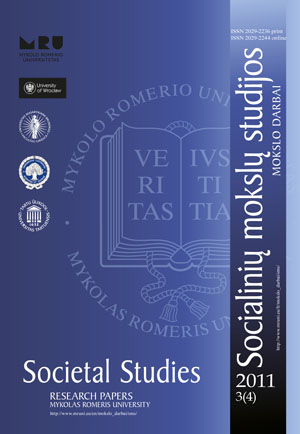Personnel Strategy Implementation Factors for Rural Communities Strengthening and for Improvement of Lithuanian Rural Government Infrastructure
Strateginiai personalo veiksniai stiprinant kaimo bendruomenes ir gerinant infrastruktūrą Lietuvos kaimiškose savivaldybėse
Author(s): Malvina ArimavičiūtėSubject(s): Social Sciences
Published by: Mykolas Romeris University
Keywords: personnel; human resources; strategy; management; planning
Summary/Abstract: The article presents the concept of personnel strategic management, analyzes the models of personnel strategy design, and the compliance of Lithuanian local government with strategic requirements in development of agriculture and in alternative activities. The analysis covers two local government activity areas: 1) strengthening of rural communities and infrastructure development, and 2) improvement of agricultural training and consulting systems. The paper identifies the major personnel strategy implementation factors, which are measured according to four criteria: the understanding of the task, implementation speed, skills, and responsibility. The article recommends setting the criteria for evaluating the success factors of human resource strategy implementation, because every strategic goal can have different success factors and a different evaluation scale. The development of strategic requirements for organisation personnel and evaluation of organisation compliance with strategic requirements also have to be related to the criteria. It is suggested that the development of human resource management strategy would include the setting of strategic goals for staff, evaluation of the importance of every human resource management function for the achievement of the strategic goals, selection of the implementation methods for each important human resource management function, investigation of the investment needs, and development of “need packets” according to the investment efficiency and the strategic importance of human resource management functions. When developing human resource policy, the paper recommends designing systems for evaluation of organisation internal factors and external environment future trends, which help to determine quantitative and qualitative personnel needs. It is suggested to establish organisational values, which will be given priority in the future, and the methods for setting value parameters. It is recommended to design the system of individual and organisational goal matching. It is determined that local government personnel have weak skills in development and modernisation of electricity and informational infrastructures. Personnel task understanding and implementation speed is acceptable in these areas. The responsibility is evaluated as good. In most cases local government personnel have average skills in establishing rural community organisations and supporting community projects and initiatives for improvement of road quality and building of new roads. Personnel responsibility is good in these areas, too. In most cases local government personnel understand the tasks of agricultural training and consulting. However, they lack skills; therefore, the implementation speed is only acceptable. In many cases, support for innovative business projects in rural areas is considered to be average according to all criteria. Local government personnel lack skills in facilitating the initiat
Journal: Socialinių mokslų studijos
- Issue Year: 3/2011
- Issue No: 4
- Page Range: 1299-1312
- Page Count: 14
- Language: Lithuanian

